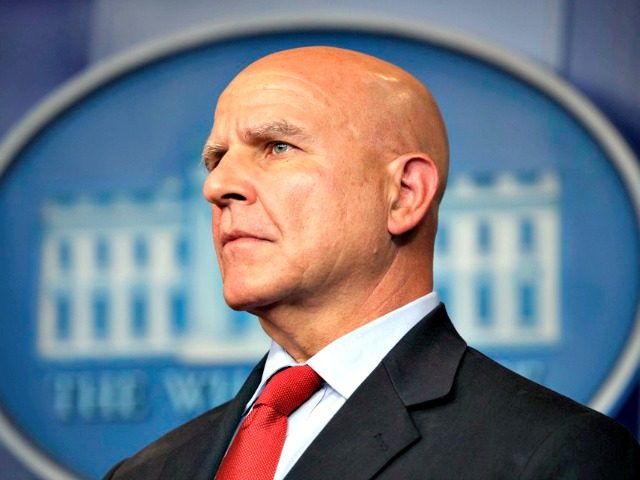National Security Adviser H.R. McMaster gave an interview to Hugh Hewitt, a conservative member of the establishment, on Saturday morning amid attacks from the president’s conservative base.
McMaster was asked about nearly every major national security issue that’s made headlines over the past few weeks, except for his recent firing of three President Trump loyalists from the National Security Council: Ezra Cohen-Watnick, Derek Harvey, and Rich Higgins.
Hewitt asked him to talk about his “role in the White House and the White House generally,” but did not ask him about the chorus of voices from the right calling for his departure.
As national security adviser, McMaster is responsible for teeing up options for the president on national security issues, but he has tried to isolate those who supported the president’s campaign and agenda, according to some former officials.
At the same time, he has allowed former top Obama officials such as Rob Malley to come and go at the NSC, according to Conservative Review.
“What we’re doing is we’re delivering what we’re calling “integrated strategies” based on the president’s guidance. And so what we had, and this is maybe understandable,” he told Hewitt.
McMaster gently criticized the former Obama administration’s infamous micromanagement of national security policy:
I don’t mean this in a pejorative sense. But the—but the White House and the National Security Council as part of that became very tactically focused. You know, it became very operational, with supervising things like troop numbers and—and specific authorities. And—and—and what we’ve been able to do is to evolve authorities back to where they belong. And instead of thinking about tactics, the next little move, we’ve been trying to view problem sets and opportunities through the lens of our vital national interests, establish goals.
Hewitt raised McMaster’s “famous book,” Dereliction of Duty, where he had criticized the members of President Johnson’s cabinet for not giving him candid advice.
McMaster said once the president makes a decision, the NSC helps “drive sensible and effective execution” of that decision:
HEWITT: “You were very critical of them for not giving the president candid, straightforward advice, limiting options. Were you naïve at the time, now that you’re livin’ that life? I mean, would you rewrite that chapter differently now that you’re livin’ that life in the middle of giving the president advice?”
McMASTER: No. I wouldn’t rewrite a word of it. And—and—and I think actually my experiences have just amplified I think for me the importance of doing—doing our duty, all of us doing our duty — to – to give the president our – our best advice. Right? And so what we do here in the National Security Council is – is we integrate the efforts of all of the departments and agencies and sometimes efforts of our multinational partners to provide options to the president.
And then once the president makes a decision, we help drive sensible and effective execution of – of — of his decisions. And so I had the – the tremendous benefit, was a real gift to me, right, to have the opportunity to – to research, read and write about a previous difficult period in history from the lens of – of the – the president and his key advisors, civilian and military advisors. And so I think that has – has helped. Doesn’t give me any answers, right? But it’s helped me ask the right questions and – and – and to make sure that, you know, that I, at least give it my best shot or I try to do my best for the president and the nation.”

COMMENTS
Please let us know if you're having issues with commenting.